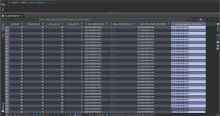See the decisions in T328032#8936008.
Acceptance criteria
- An individual participant's answer must be aggregated after 90 days from first answer
- All remaining unaggregated answers must be aggregated when the event ends
- All answers must be deleted after aggregation, including those to non-PII questions
- After aggregation and deletion, the relevant records in the ce_participants table should be updated with the aggregation timestamp (ce_participants.cep_aggregation_timestamp)
- The script should be documented in the extension's manual.

